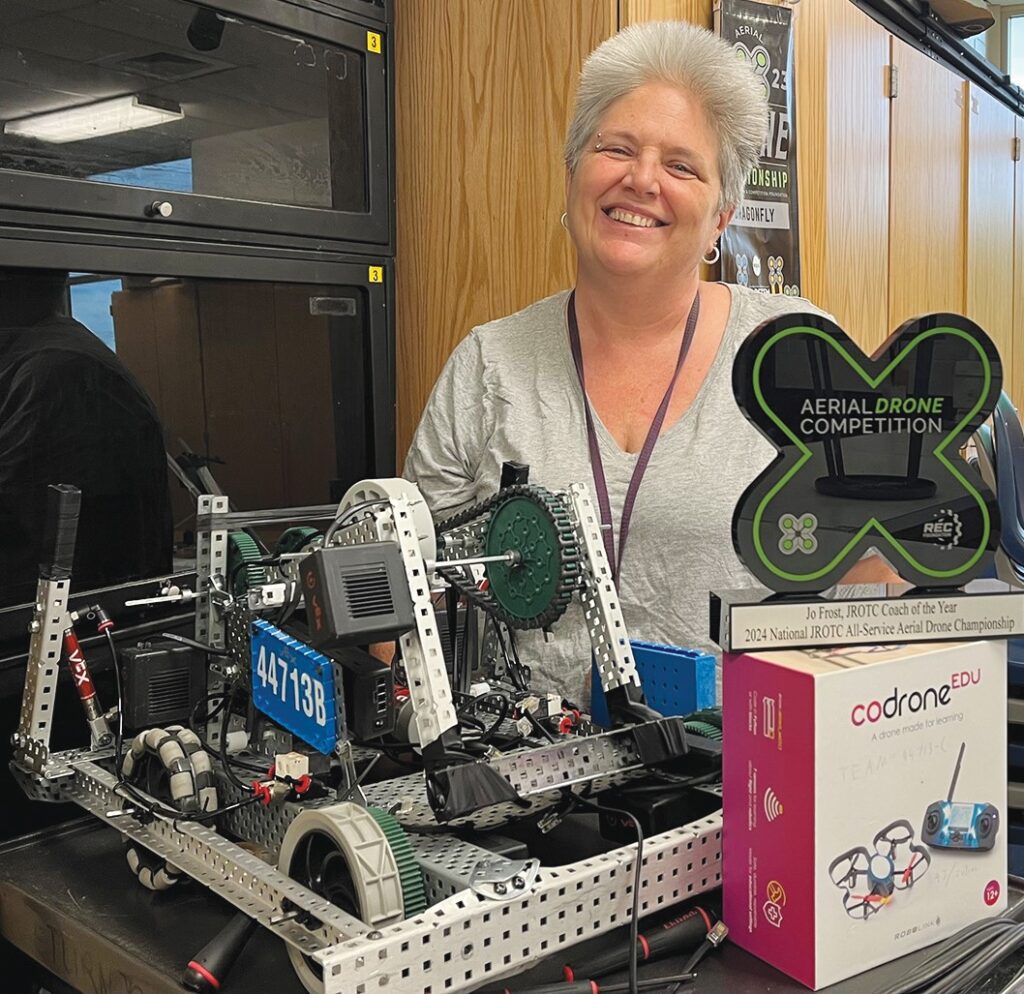
Jo Frost is a teacher at Woodrow Wilson High School in Raleigh County, where she is involved with the robotic program. She first applied for a position in Fayette County. She tells us, “I was offered a job in just a week. I was surprised that the situation in West Virginia was so dire, 15 years ago, that I would be a desirable candidate, even uncertified.” After the offer from Fayette, Jo took some time to consider the teaching profession. She took pedagogy classes at Concord University.
Within a year, she had taken enough to qualify for a “Transition to Teaching” program in math. “I felt like the support in that program was strong for novice teachers.” She felt teaching would provide stability for her family. She was first offered a position at Woodrow Wilson High School. She taught a brief stint at Shady Spring High School but returned to Woodrow Wilson, so she could also coach robotics.
Recently, Jo was nationally recognized as Coach of the Year at a JROTC drone competition event in Mississippi. She was nominated for the award by Sgt. Williams, the event planner. The award was for more than just winning competitions, it was for the positive experience she offers her students. She tells her students that competitions are for more than just winning, “we are there to play and learn. Our students do learn and build community through our volunteer services.” Sgt. Williams noticed how Jo stepped up and filled volunteer roles for the competition that needed to be staffed. Jo noted that even coaches need coaching from time to time and she has filled that role. There are two types of drone competitions in JROTC. Discovery Drones and ADC (Ariel Drone Competition). Discovery Drones is an outside, racing-style drone competition similar to the Drone Racing League.
The Ariel Drone Competition has students piloting drones through an obstacle course. The drones must be pre-programmed by the students and fly through the course autonomously. These types of competitions prepare students for careers in projects like NASA’s Dragonfly Mission that will send a drone to Titan, Saturn’s largest moon. Jo described the program, “Drone competitions have many aspects. There is coding for independent flying, a teamwork competition, and an engineering notebook competition to see if the team tracks their growth through engineering research procedures. Teams also interview with judges, so we often practice interview techniques because many students that are interested in flying drones may not be top rate communicators.” Regarding the latest competition in Mississippi, Jo told us, “I have coached ADC drones now for three years and I had enough JROTC cadet participants that I checked a box on the Robot Events site for a JROTC team. The nationals host cast a wide net, inviting our JROTC drone team to nationals, even though the team was less than a year old. As I do for every competition, our International Robotics Honor Society students also joined us in Mississippi to assist with running the competition.”
We asked Jo about her diverse background. Students are often “surprised that someone who has lived in places like the Italian Alps or Seoul Korea would be teaching their math class in Beckley, WV.” Jo feels that teaching is a rewarding profession and has had some great mentors along the way. “Teresa Epperly was my most patient mentor along the way.” In the robotics field she had several good mentors through the Katherine Johnson Education Research Center like Todd Ensign, John Holbrook, and Ryan Utzman. She also had Jim Higgins, previous coach and mentor through First Robotics Competition.
We asked her about her experiences taking the non traditional route into education. “Coming into education from alternative certification, I think we can stand to offer more grace to people who are willing to teach. I resent that we are a political football, gaining air time for candidates, because teachers give so much that is not documented or renumerated. I am so grateful to my mentors, and my colleagues, for their generosity in helping me grow as a teacher. Ultimately, there is always room to grow, no matter your path to teaching.”
She commented on some of her frustrations as well. “Teachers that do, do all the things. It is exhausting, and increases burnout. It would be beneficial in earlier teacher education programs, if it was emphasized that schools do not function well when teachers leave without commitment at the end of the work day. I would like to have more free time, and perhaps, more time for self-care, but I also have a passion for STEAM education in WV, which I believe is an underserved population. I came from a strong STEAM background in NC and WV is behind NC in the 1980’s in STEAM education, which frustrates the life out of me. I’m so grateful for the opportunities I’ve had through robotics and drones coaching, as well as the trust placed in me by my families. I would be happy to help start other teams across the state to grow opportunities for our students—they could travel to Mississippi after all!”